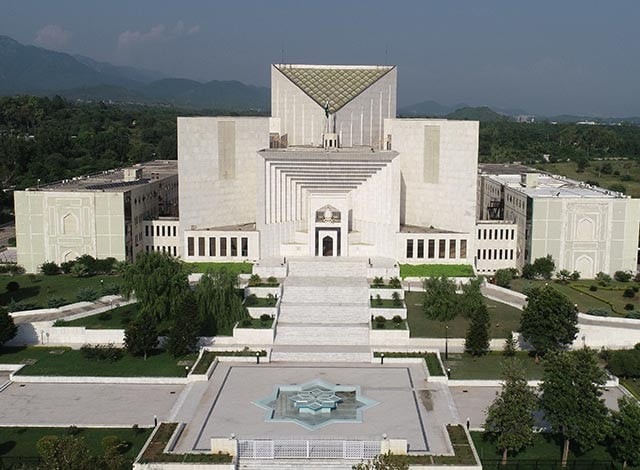SIC’s reserved seats issue lands in SC
Party challenges PHC verdict depriving party of its share

The Sunni Ittehad Council (SIC), comprising PTI-backed lawmakers, challenged on Monday the Peshawar High Court’s March 14 order that deprived the party of reserved seats.
The PHC through its verdict dashed the PTI's hopes of getting reserved seats as it dismissed the SIC’s petition challenging the Election Commission of Pakistan’s (ECP) ruling that denied reserved seats to the party.
Advocate Faisal Siddiqui filed the petition, on behalf of the PTI-backed-SIC, that stated, “It is, therefore, most respectfully and most humbly prayed that leave to appeal against the Impugned Judgment dated: 14-03-2024 passed by the Honourable Peshawar High Court in Writ Petition No.1272-P of 2024, may graciously be granted and after granting leave to appeal, this Honourable Court may graciously set aside the Impugned Judgment dated: 14-03-2024 and allow the Writ Petition No.1272-P of 2024, as prayed.”
The petition states that the PTI candidates joined the SIC after their party lost its electoral symbol, adding that the ECP also raised no objections to the above independent returned candidates joining the SIC.
“The Impugned Judgment is based on a fundamental misconception and misinterpretation of Article 51 as well as Article 106 of Constitution, 1973,” the petition read.
The party has contended that the fundamental premise of the proportional representation system for allocating reserved seats for women and non-Muslims, as outlined in Article 51(6)(d)(e) and Article 106(3)(c) of the Constitution, 1973, does not hinge on whether a political party submits candidate lists for reserved seats before the general election or whether the party contested the election.
Instead, the party asserts that the core constitutional basis for the right to reserved seats under the proportional representation system is determined by the "total number of general seats secured by each political party from the province concerned in the National Assembly" or the "total number of general seats secured by each political party in the provincial assembly.
"PTI loses reserve seatsA five-member bench led by PHC Chief Justice Mohammad Ibrahim Khan and comprising Justice Ijaz Anwar, Justice Ishtiaq Ibrahim, Justice Shakeel Ahmad, and Justice Arshad Ali ruled against PTI’s right to reserve seats.
During his arguments, SIC’s lawyer Barrister Ali Zafar said the Constitution does not mention when a party has to submit a list of names for reserved seats to the ECP.
He argued that it is not written anywhere that a person cannot resubmit the list or when it has to be submitted, adding that there is no restriction on providing a second list and that the ECP could have issued a second schedule, as it did for the general elections.
Justice Ijaz Anwar remarked that as per the law, those who participate in elections will get seats.
The court then questioned Barrister Zafar if it was not clearly stated anywhere that the second schedule could not be issued. "The law does not prevent the Election Commission from issuing another schedule," the lawyer responded.
Justice Arshad Ali remarked that Section 104 explains the mechanism for reserved seats as it states that when a list is submitted another can be given.
"Section 104 says that if a political party participates in an election, it will give a list," the lawyer argued.
He earlier argued that whoever wins the number of seats, gets reserved seats in the same proportion and their seats cannot be increased.
Earlier, Attorney General for Pakistan (AGP) Mansoor Usman Awan informed the PHC that the SIC was denied the reserved seats because it did not contest the February 8 general elections.
Justice Ibrahim inquired whether any SIC candidate succeeded in the February 8 election, to which Anwar replied negatively. Justice Arshad noted that even the SIC chairman contested the election as an independent candidate.
The AGP defended the ECP's decision, stating that the SIC had not submitted any list for the allocation of reserved seats before the election, a mandatory requirement under the law.
Responding to a query about redistributing the seats to other parties if not allocated to the SIC, the AGP asserted that parliament would be incomplete without the allocation of those seats, emphasizing the importance of representation for women and minorities.
On March 4, the ECP accepted applications of the opposing parties and decided that the seats in the National Assembly and provincial assemblies would not remain vacant and would be allocated by a proportional representation process of political parties based on seats won by political parties.



















COMMENTS
Comments are moderated and generally will be posted if they are on-topic and not abusive.
For more information, please see our Comments FAQ